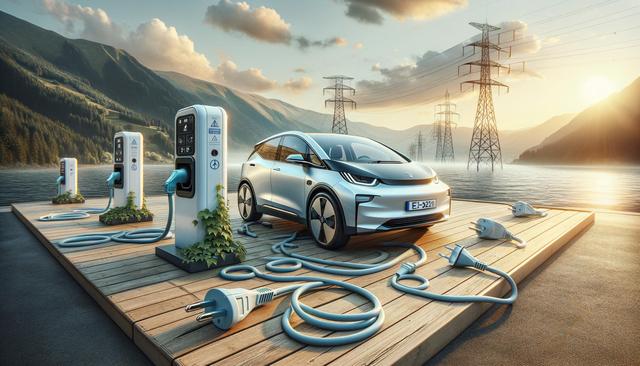Environmental Benefits of Electric Cars
One of the most notable advantages of electric cars is their positive impact on the environment. Unlike traditional vehicles powered by internal combustion engines, electric cars produce zero tailpipe emissions. This significantly reduces the amount of greenhouse gases released into the atmosphere, contributing to cleaner air and lower carbon footprints. As more countries and cities work to combat climate change, the shift toward electric vehicles (EVs) aligns with broader environmental goals. Additionally, electric cars can be powered by renewable energy sources such as solar or wind, further enhancing their environmental friendliness. By reducing dependence on fossil fuels, EVs support a more sustainable energy future.
In urban areas, where air quality is often a significant concern, electric cars contribute to reducing smog and improving public health. The quieter operation of EVs also helps lower noise pollution, making cities more livable. These benefits make electric cars an appealing option for eco-conscious consumers and policymakers alike.
Lower Operating Costs
Electric cars offer a compelling economic advantage through lower operating costs. Electricity is generally cheaper than gasoline or diesel, and the cost per mile to operate an EV is typically lower than that of conventional vehicles. Additionally, electric motors are more efficient than combustion engines, converting a higher percentage of energy from the battery into movement.
There are also fewer mechanical parts in electric vehicles, which translates to reduced maintenance costs. Common services like oil changes and exhaust system repairs are unnecessary for EVs. Here’s a list of common cost-saving benefits:
- Lower fuel expenses due to electricity being less expensive than gasoline
- Reduced maintenance needs due to fewer moving parts
- Incentives and rebates offered by governments to encourage EV adoption
These financial benefits make electric cars not only an environmentally responsible choice but also a practical one for the budget-conscious driver.
Performance and Driving Experience
Many drivers are surprised to find that electric cars offer a smooth and enjoyable driving experience. Electric motors provide instant torque, resulting in quick acceleration and responsive handling. This makes EVs particularly appealing for city driving, where stop-and-go traffic is common. In addition, electric vehicles tend to have a low center of gravity due to battery placement, which can enhance stability and cornering.
Manufacturers continue to innovate, offering advanced features and smart technology integration in electric cars. These include regenerative braking systems, which help recharge the battery while slowing the car, and various drive modes to optimize performance or efficiency. The quiet operation of electric motors also contributes to a more peaceful driving environment, which many users find preferable to the noise of traditional engines.
Given these benefits, the driving experience in an electric car often exceeds expectations, combining performance, technology, and comfort.
Energy Efficiency and Technological Advancements
Electric vehicles are leading the way in energy efficiency. Unlike combustion engines, which lose a significant amount of energy as heat, electric motors convert energy more directly into motion. This higher efficiency means that less energy is wasted, making each charge go further. As battery technology advances, the range of electric cars continues to improve, alleviating range anxiety and making EVs more practical for longer trips.
Recent innovations have brought about more efficient battery designs, faster charging capabilities, and extended vehicle ranges. In addition, many electric cars are equipped with smart energy management systems that allow drivers to monitor and optimize their usage patterns. Some models even support vehicle-to-grid (V2G) technology, enabling them to return electricity to the grid during peak demand.
These technological advancements underscore the growing capability and appeal of electric cars, positioning them as a forward-thinking transportation solution.
Contribution to Energy Independence
Electric cars play a role in enhancing national and personal energy independence. By relying on locally produced electricity rather than imported oil, countries can reduce their dependence on foreign energy sources. This shift not only supports energy security but also stabilizes fuel prices by lowering exposure to global oil market fluctuations.
On a personal level, electric car owners can take further control by generating their own energy. For instance, pairing an electric car with residential solar panels allows homeowners to charge their vehicle using sunlight. This reduces reliance on public utilities and potentially lowers energy costs even further. Key benefits of this independence include:
- Reduced vulnerability to oil supply disruptions
- Greater control over energy sources and costs
- Support for local energy production and infrastructure
As energy strategies shift toward sustainability and self-sufficiency, electric cars are a practical and impactful part of the solution.
Conclusion: Why Electric Cars Are a Smart Choice
Electric cars offer a wide range of advantages that make them an increasingly smart choice for today’s drivers. From environmental sustainability and lower operating costs to advanced performance and energy efficiency, EVs are well-positioned to meet the demands of modern transportation. Their contribution to energy independence further strengthens their value, both individually and collectively.
As technology continues to evolve and charging infrastructure expands, electric vehicles are becoming more accessible and viable for a broader audience. Whether motivated by environmental concerns, economic benefits, or a desire for cutting-edge technology, consumers have many reasons to consider making the switch to electric.










